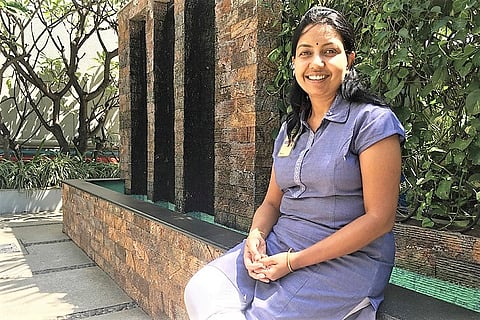

Women in Tech is a special series of stories of women who have pushed boundaries to make it big in the Indian tech space, which is still largely a male domain. In this series, we ask them what it’s like to be a woman in Indian tech, the challenges they face and lessons they can share from their journey with aspiring women technologists.
Roopashree HM has been an integral part of the very-large-scale integration (VLSI) semiconductor space for over two decades. She is currently Director, WW Analog EDA with global semiconductor design and manufacturing company Texas Instruments. Even at a time when there were hardly any women in the technology space, Roopashree was working on cutting edge technology from memory designs, high speed digital designs to now creating best-in-class analogue designs at TI.
Having worked on core technology for 22 years, Roopashree says that while she, as a woman, did not experience any gender bias in her professional career, she began facing challenges due to changes in her personal life. It started when she had her first child back in 2002.
“It was personally very hard for me. I wouldn’t say there was anything in the system that made it hard, some of it was very personal. I found it very hard because my baby was only 6 months old and technology needs a steep pace to learn and I was used to that pace. It was very challenging. So, I took a second break when my daughter was 1.5 years old to figure out how I could make it work better. Once my daughter turned two, I felt that I had the mind space to do what I would have done two years ago. And TI enabled me by giving me that time. If you don’t ask for it, it becomes very hard. And asking itself sometimes becomes very hard,” she says.
Creating a support system
While things are changing for the better for women, employers play a major role in enabling that. Roopashree says that one needs the support of the organisation to have the confidence to go and ask for things. “While we also cannot discount the support you need from family, kids and whatever extended support you put in place, if workplace is not conducive, it becomes very hard. So yes, employers have a massive role to play here,” she adds.
And along with support from the company, Roopashree also believes that women themselves should ask for what they want. She was able to take a second break because she was able to ask for it. Similarly, women should be empowered to ask for things, which is slowly happening, she says.
Today, women entering the technology field are a lot more confident, Roopashree says. There is more acceptance towards women working on projects, on relocating, and in society as well, there is generally more acceptance, she believes.
“Girls, especially in TI, are so much more assertive now. They are open about having conversations on what they want to work on and what they don’t want to work on. What opportunities they want and even the compensation they deserve. These are things women used to hesitate to ask and I’m so happy to see so much more confidence. And at TI, I also encourage them to come forward and ask,” Roopashree adds.
On a broader level, she says that India too, culturally, is much more focused on Science, technology, engineering, and mathematics (STEM), where a lot of girls opt for this field and hence, we have a lesser challenge when compared to countries such as the US.
But it is in deep tech that one starts to see a difference. Roopashree believes that core technology companies should look to have representation within the company for women. “That’s the minimum we should do. Look at hiring more from women engineering colleges. We should also have more tech-focused seminars and conferences where women can participate. These will help bridge technical barriers among women and help with networking,” she adds.
As for women looking to enter the technology space and making it big, Roopsharee’s advice is to focus on creating a body of work early in your career. She says that it is important to read a lot, write papers, participate in conferences, write patents.
“Focus on building technical expertise. Whatever role you do in the future, even if it is managerial, it is very important to be technically sound. There is a lot more dialogue around these things today, every woman should leverage that,” she adds.